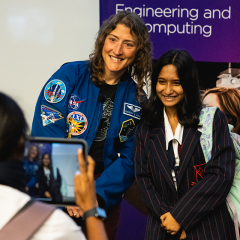A leading power and energy engineering researcher from The University of Queensland, Professor Firuz Zare has received global recognition by being named a 2021 IEEE Fellow.
The IEEE is the world’s largest association of technical professionals, spanning 160 countries and areas like telecommunications, electric power systems, computing and biomedical engineering.
Professor Zare, who has more than 20 years’ experience in academia, industry and serving on global standardisation bodies, received the prestigious title for his outstanding contribution to the field of power converters and for his leadership in standardisation.
Professor Zare’s work has focused on the issues and solutions associated with expanding renewable energy networks and how to keep energy distribution networks safe and secure through this change.
“A high penetration of renewable energy systems has the potential to degrade the power quality of grids, introducing strong resonances in grids, harmonics and flicker which pose serious risks to power systems and the equipment connected to them,” said Professor Zare.
“These issues can cause failures in grid communication, degradation of equipment such as distribution transformers, losses of energy, challenges in the measurement of voltage and current and system protection, difficulties in maintaining the requirements of the electricity codes and contractual obligations to the users.”
With his deep knowledge and experience in this area, Professor Zare has secured over $9M in research funding since 2007, receiving $3.5M from government, industry and university partners to address ‘Emerging Issues of Future Grids’.
Pulling together interdisciplinary research that looks at important design factors, fundamental research concepts and mathematical analysis to help solve real-world issues in energy, Professor Zare has advanced the knowledge of grid-connected solar inverter systems; high-efficiency energy conversion systems and the impact of high penetration of grid-connected inverters on distribution networks.
Building on his knowledge in this area, Professor Zare has also been working on the international standardisation of grid-connected renewable energy systems.
Elected to the global not-for-profit, the International Electrotechnical Commission (IEC) in 2013 to lead this project, Professor Zare has worked to prepare several technical reports in collaboration with his team, informing how solar inverters and wind turbines are to be utilised in all power networks around the world.
This prestigious and challenging role will soon culminate in the publication of a world-first international standard IEC 61000-3-16.
Professor Zare has also received several awards such as an Australian Future Fellowship and John Madsen Medal for his innovative contributions to power converters and high-frequency harmonic modelling and analysis.



